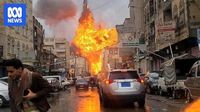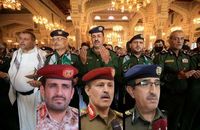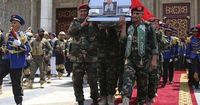In a dramatic escalation of hostilities in the Middle East, Israel launched a targeted airstrike on August 28, 2025, killing 12 senior leaders of Yemen’s Houthi movement, including the group’s prime minister, Ahmed al-Rahawi. The strike, which hit the capital city of Sanaa, has reverberated throughout the region, sparking vows of revenge from Houthi leaders and raising questions about the future of the Iran-backed rebel group.
The funeral for the slain officials drew thousands of mourners on September 1, 2025. According to Reuters, the crowd chanted, “God is Great, Death to America, Death to Israel, Curse on the Jews, Victory to Islam,” a slogan that has become synonymous with the Houthi movement’s anti-Western stance. The assassination marked the most significant blow yet to the Houthis’ political leadership since they seized control of northern Yemen and Sanaa in 2014.
The Israeli strike targeted a gathering of senior Houthi officials who had assembled to watch a televised speech by their elusive leader, Abdul Malik al-Houthi. Among those killed was Prime Minister Ahmed al-Rahawi, the most senior Houthi figure to be eliminated in Israel’s ongoing campaign against Iran’s proxies in the region. The attack also left several other political leaders seriously wounded, though it remains unclear whether key military figures such as chief of staff Muhammad Abd al-Karim al-Ghamari and defense minister Mohamed al-Atifi were among the casualties.
According to a statement carried by Houthi-run television and reported by CNN, the ministers had gathered for a routine workshop to evaluate the government’s activity and performance over the past year. The timing and concentration of leadership in one location presented what Israeli officials described as a prime opportunity for a decisive strike.
The motivation behind Israel’s action was clear. The strike was in direct retaliation for a Houthi ballistic missile launch toward Israel on August 22, 2025, which notably marked the group’s first use of a cluster bomb since the outbreak of the Israel-Hamas conflict in 2023. The Houthis, who have repeatedly targeted Red Sea shipping and fired missiles at Israel in solidarity with Palestinians, have become a persistent thorn in the side of the Israeli government.
Israel’s defense minister, Israel Katz, confirmed the operation, calling it an “unprecedented knockout blow” to Houthi leadership. In a statement reported by CNN, Katz declared, “The Houthi Prime Minister, most of his ministers, and other senior officials were eliminated and injured.” He added, “I warned that after the ‘plague of darkness’ would come the ‘plague of the firstborn’—and now we have carried out that warning.” Katz further warned that this was “just the beginning,” promising that “the Houthis will learn the hard way that whoever threatens and harms Israel will be harmed sevenfold.”
This strike marks a significant shift in Israel’s approach to the Houthi threat. Previously, Israeli operations in Yemen focused on military targets and infrastructure. Now, Israel is directly targeting the leadership of Iran’s regional proxies, a strategy it has previously employed against Hamas and Hezbollah. In the past two years, Israel has killed Hamas leader Ismail Haniyeh in Tehran, Hezbollah leader Hassan Nasrallah in Beirut, and Hamas leader Yahya Sinwar in Gaza, according to CNN. The latest action in Sanaa signals that Houthi leaders are now firmly in Israel’s crosshairs.
For the Houthis, the loss of so many senior figures is a severe blow. Nadwa Al Dawsari, a fellow at the Middle East Institute, told ABC News Australia that the strike “exposes the Houthis’ vulnerabilities and shatters the image of strength the group seeks to project. It demonstrates that Israel now possesses the intelligence and operational reach to target Houthi leaders inside Yemen with precision.” She added that the attack might prompt a brief reduction in Houthi activity, but cautioned against overestimating its long-term impact, as the group is deeply entrenched and has shown resilience in the face of adversity.
Australian National University’s Charles Miller echoed this sentiment, telling ABC News Australia, “In the long run, I can’t really see it having much of an effect because they’re such a well-established group.” The Houthis have controlled much of northern Yemen since 2014, when they ousted the internationally recognized government. Despite years of efforts by a Saudi-backed coalition, the group has only consolidated its grip on power.
In the immediate aftermath of the strike, the Houthis launched what experts described as “frantic internal hunts” for possible informants, arresting several of their own members suspected of leaking information to Israel, according to Al Dawsari. This internal paranoia could drain resources and sow distrust within the movement, a dynamic that Israel may have been hoping to trigger. As Miller explained, “That’s one of the reasons why countries like Israel do strikes like this—because it starts to set people against one another.”
Yet, the Houthis’ response has been defiant. Mohammed Miftah, now the de facto head of the Houthi government, and Mahdi al-Mashat, head of the Supreme Political Council, both vowed swift and severe retaliation. In a televised address, al-Mashat declared, “We promise to God, to the dear Yemeni people and the families of the martyrs and wounded that we will take revenge and we will turn the wounds into a victory.” Abdul Malik al-Houthi, the group’s top leader, echoed the sentiment, stating, “Our military approach to targeting the Israeli enemy, whether with missiles, drones or the naval blockade, is a continuous, steady and escalating one.”
The Houthis have a history of using such attacks to tighten internal control, justify forced recruitment, and reinforce their narrative of perpetual war. As Al Dawsari observed, “Instead, the group will weaponize [the strike] to tighten repression, indoctrinate children, justify forced recruitment and sustain its narrative of perpetual war. These steps will strengthen the group over time.”
Meanwhile, Israel’s Prime Minister Benjamin Netanyahu has promised that the campaign against Houthi leaders is far from over. According to The Times of Israel, Netanyahu stated, “We will reach all of them,” signaling further escalation may be on the horizon.
As the dust settles in Sanaa, the broader implications of this strike remain uncertain. The Houthis’ ability to absorb such losses and maintain operational capacity will be closely watched by regional powers. For now, both sides appear locked in a cycle of attack and reprisal, with the potential for further violence looming large over an already volatile region.
In the aftermath of this unprecedented strike, Yemen’s Houthi movement faces an uncertain future, but the cycle of retaliation and resistance shows no sign of abating.



